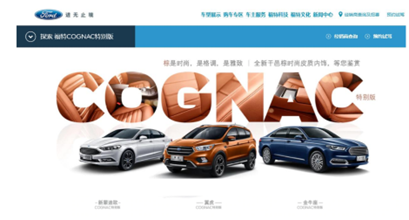HE Wei, first published by WTR
The dispute involved the Bureau National Interprofessionnel du Cognac (BNIC) - the French organisation responsible for promoting and safeguarding the geographical indication (GI) ‘Cognac’ - and the Chinese affiliates of Ford Motor Company, a prominent automotive supplier (hereinafter referred to as ‘Ford China’).
Background
In 2018 Ford China launched a series of vehicles under the name ‘COGNAC Special Edition’ (as shown below), including models like the ‘EcoSport COGNAC Special Edition’ and ‘Mondeo EcoBoost 180 COGNAC Special Edition’.

These vehicles were promoted on Ford China's official website and other media. The marketing campaign went as far as using the tagline of "Not all brandies are Cognac, not all Fords are Cognac", which inappropriately leveraged Cognac's prominent position on the brandy market to promote the premium quality of the Ford Cognac series of vehicles. In addition, Ford China used ‘COGNAC Brown’ to refer to the colour of the interior decoration of these vehicles.
The BNIC filed a civil lawsuit to challenge such use by Ford China on the basis of its ‘GI product’ registration for ‘Cognac’ with the Administration of Quality Supervision Inspection and Quarantine, now the China National Intellectual Property Administration (CNIPA). In the absence of a specific GI law, the BNIC based the action on the Anti-unfair Competition Law.
Decisions
The case was initially heard at the Suzhou Intermediate People's Court (with a first-instance decision being rendered on 23 November 2020) and subsequently appealed to the Jiangsu Provincial High People's Court (with a second-instance decision being rendered on 9 August 2023). Both courts arrived at the same conclusion: Ford China's actions constituted unfair competition. The legal reasoning behind the decision was multi-faceted:
• Protection under the Anti-unfair Competition Law: the court clarified that GIs can seek protection under China's Anti-unfair Competition Law by resorting to the general principle of good faith, as stipulated in Article 2 of the law. This aligns with the TRIPs Agreement, to which China is a signatory, which provides legal means to prevent unfair competition concerning GIs.
• Existence of a competitive relationship: although Ford China and the BNIC operated in different industries, the court emphasised that they were in a competitive relationship. This is because both vie for consumer attention in a broad sense.
• Insufficient evidence of genericide: Ford China attempted to justify its infringing use by arguing that ‘Cognac’ had become a generic term. However, the court found that the evidence provided was insufficient to support this claim, especially within the context of the Chinese market.
• Establishment of unfair competition: the court ruled that, by using the term ‘Cognac’, Ford China was exploiting the reputation of a protected GI to elevate its own brand, thereby gaining an unfair competitive edge. Such behaviour could cause other harms, such as increasing the risk of genericisation of the GI and reducing the opportunities for the GI owner to engage in cross-class business cooperation.
Comment
The case serves as a pivotal legal precedent for right owners searching for civil remedies in cases involving GIs registered as GI products in China. Not only does it confirm that GI products registrants may act on the basis of the unfair competition law, more importantly, it also considerably extends the concept of ‘competitive relationship’. This is not without similarity with the very broad EU concept of ‘evocation’, which is specific to the protection of GIs: a simple ‘a(chǎn)ssociation’ in the mind of the consumer is sufficient to trigger protection. The products or services concerned do not even need to be similar.
While the finding concerning the absence of genericity is satisfactory, it may be pointed out that, according to EU regulation, a protected GI (unlike a trademark) can never become generic.
In summary, the present case offers valuable insights on future GI protection practice in China.



